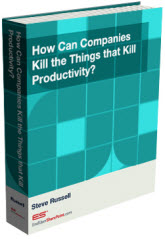Why Community? Some just don’t get it…
More and more my presentations are gearing towards talking about community. My latest one, “Building a SharePoint Community”, is a step-by-step walk through of how EndUserSharePoint.com became a central community around SharePoint End Users and what people can do to develop their own communities.
The dilemma is this: Marketing people get it right away… I mean almost IMMEDIATELY. However, I’m having difficulty convincing sales people of the value of becoming part of a community. We’re not just talking about SharePoint here. Pick your target. Think of your own sales staff.
We all have the same problem when it comes to sales. We’ve got to get a HUGE pipeline of potential clients going through the pipe, trying to close a certain percentage of deals to get everything to work. I understand that. I know the constant pressure sales are under to “A.B.C. – Always Be Closing!”. But there’s something missing in the process, and that something is relationship building for the long run.
Help me out here. Why have you become part of the EndUserSharePoint.com community? Why do you participate in the site? Why are you part of the SharePoint Community in general? Help me frame a message to the sales people of all SharePoint companies and vendors: THIS is why we particiapte in community. What is the real value for a sales team to become part of an existing community?
To me, it’s almost a rhetorical question, but more and more I see that the community message isn’t clear and doesn’t resonate with the sales audience. I want to make a presentation on “Why Community Matters: A Sales Perspective“. I’ll make a recording as soon as I get clear on the message and make it available here on the site for you to download.
Your input is greatly appreciated.












Personally I participate in the EUSP community because I’ve learned so much from the site, when asked to contribute I felt obligated to give back a bit of what I’ve gained. To me Sharepoint is a little like religion in that you get out of it what you put in. There is no end to the knowledge that you can gain from those in the community, there are hundreds of new ideas every week that are exposed regarding best practices, new discoveries and ideas, great minds at work to help the rest of us find our way. If you don’t follow the community you’ll never hear them. If you follow the community you create traffic, that seems like a ‘no brainer’ in my book as far as sales go.
* Sales people have individual sales numbers they have to hit.
* Sales people need to make sales in order for them to receive their sales bonus, or the balance of a promised salary based on quota.
* Sales people often fancy themselves as smarter, more in-tune or understanding nuanced situations better than the general population.
See a recurring theme here? Sales people often are focused on individual goals (usually theirs), not the goals of the entire sales force in their company.
A collaboration and community mindset requires one to: 1) value the community goals over individual goals, and 2) contribute to a movement or group without the expectation of receiving something in return (the antithesis of sales).
Those who are active in the SharePoint community can be generalized as ‘givers’, people who give of their time, knowledge and talent in the hope of assisting or influencing others. Those who give with the sole purpose of receiving are easily found out and are often avoided while those that give from their heart, based on their passion, attract people to themselves.
Not all sales people have large egos or contribute to something with the expectation that they will receive immediate benefit in return. Most are extremely hard working, dedicated professionals. Often, however, they don’t see the benefit of joining a community, especially one as passionate as the SharePoint community, and, if they do, they are oftentimes avoided.
I contribute to the SharePoint community because of my knowledge, my passion, my belief in the people working within the community and because, in some small way, I hope to make the lives of those using SharePoint a little lighter and easier. I can do all of this, however, because I do not have a huge sales quota that’s increased every quarter.
As one of my friends, who is a passionate sales person, often said, “Nothing happens without a sale.” Sales allows me to do the fun things that I get to do each and every day and, for the benefit that I am able to realize due to their work, I will continue to not expect sales to wade into the SharePoint community pool. I’ve got that covered for them.
There’s my Jerry Maguire-esque Manifesto…..
Some classes of products don’t necessarily lend themselves to ’sales’ as classicly organized, e.g. outbound calling, preparing quotes, dropping off glossy brochures, etc. A lot of products in the current places business need solutions either clearly meet a need, or don’t. Or when choosing among multiple products, the products will be compared based on merits around a particular need. In government, for example, it might be illegal, or unethical at least to let some common sales techniques affect a purchase decision, and in private business could certainly be not in the ‘owners/shareholder’s’ best interest.
Reducing the barriers to purchasing your product is important. So, for how sales can get involved in the community, , I would say be facilitating the sale more than directly making the sale will be a reality. Since sales isn’t likely directly improving the product, but by playing a sales engineer role – be available via twitter or your company’s forum, answering and routing questions. A need that is unmet, play the role of a customer advocate, pushing your team to add that feature to the product so that the sale can be met (part of ‘trial closing’?)
I was just reading back through these comments, and your mention of sales engineering stood out to me. In addition to sales quotas, I think there should be some kind of product feedback commitment for these folks to encourage/facilitate the formal capturing of customer and partner feedback, which can be translated into product improvements.
Look, I realize that the majority of salespeople would make a sour face at that suggestion — keep the peas and mashed potatoes separate — as this takes them away from the traditional ABC model, but its a more holistic way of building/selling/supporting products. Everyone needs to take responsibility for improving the product/service, just as everyone needs to be responsible for improving the customer experience. How you implement that in your company is up to you.
One of the main reasons I came to EUSP community was because my company is in a rather nontechnical industry and as such has very few computer users, therefore does not see the benefit of spending a lot of money on SharePoint. This doesn’t mean they don’t value SharePoint, quite the opposite, but it is hard to justify spending a lot of money on add on products and features, for a free product (we use SharePoint foundation) that is used by only a handful of people. So I needed to find ways to make WSS 3.0 and then Foundation do what we needed on my own. That is why I came to the community, because it offered actionable, recreatable solutions, for more than just SharePoint server.
I stayed with EUSP because of the community itself. I have often been put off by the negativity, and destructive attitude of some other communities, where is seems cutting down the author of an article was some form of sport. At EUSP the community is positive, we are appreciative of the time and effort an author puts in to an article, we do not expect a contributor to be perfect, nor do we cut them down. In fact we tend to take an idea and run with it, adding to it, suggesting improvements, or other ways the idea can be used. How many new articles and ideas have been fostered by an article someone else wrote? We truly collaborate, and it creates a positive and welcoming environment.
What is more the community empowers its members. Because you don’t have to be perfect, or some famous SharePoint author, community members feel secure in submitting their ideas, which other members can use, and/or improve upon starting the cycle all over again.
To sell in a community where people freely offer their time, knowledge and experience you have to rethink your approach. You need to be a part of the community, contribute to the community, and then offer your company’s expertise to take the solution to a higher level. Because of all the wonderful solutions I learned from EUSP, my company was willing to spend money on the EUSP workshops. I also have used some of Bamboos free solutions, which lead to purchasing some of their products. Seeing a trend here? When it came time to spend some money we knew we would get our money’s worth.
Just my two cents. :)
There are a hundred reasons I could give for why I care about the community, love it, and have always enjoyed being a part of it. However Mark asked for a targeted ‘pitch’ so here is my attempt at it.
Note: I agree with Lee’s points. So this is focused on individual benefits.
To a SharePoint Salesman:
- Community events can be a source for leads. As can community contribution. Not always immediately, but I can say from experience that it definitely generates leads.
- Community contribution (events or online) doesn’t necessarily have a strong lead correlation, however understanding the pulse of the community, market trends, and the scenarios/issues people encounter with the Technology allows you to have a higher close rate.
- If you are selling services:
Having community presence, brand, acknowledgment, and understanding will lead to higher bill rates. Hopefully because you truly care about what you do, your customers, and the community. In addition see the above items.
- If you are selling products:
Having community presence, brand, acknowledgment, and understanding will lead to more awareness of your products and higher levels of interest. This makes closing much easier. Not only that, but showing community support shows that your organization has a human, caring, and supportive staff. Leading to more value in them purchasing additional things like multi-year support from your company.
- Learning, sharing, and vetting your ideas with the community will make you more effective at explaining technology value propositions, challenges, and help you improve your professional skill set.
Quite frankly with the way the technology industry is maturing, the way social is becoming a dominant influence on purchasing, and that passionate vocal people can now easily share: If you don’t start to get ‘involved’ in community your sales can’t be as successful or high as those who are.
Hopefully this helps give you some ammunition Mark and helps anyone sitting on the fence,
Richard Harbridge
P.S – There is a BIG difference in involvement/contribution and meaningful involvement/contribution. The way to tell the difference is by what motivates you. In the long run maybe you get started for those personal reasons – but eventually if you really care then it becomes about helping the community or helping others not about helping yourself. What motivates you? :)
Errr or saleswoman. Apologies.
The hard part of an evangelism role is that you do need to quantify your activities, understand and get buy in on certain metrics that show you are helping drive the business, and make sure those metrics are tracked and visible to the business. There’s no out-of-the-box solution to this. How do you measure and present qualitative value to people with a purely quantitative perspective?
You can track things like blog/web trending, event leads, downloads, registrations, etc through various campaign management tools and methods, but this does not always give you the entire picture/value/importance of this role.
How do you measure influence? Here’s a scenario:
1) Three people see you speak at a SharePoint Saturday
2) One of them also sees you at the Best Practices Conference
3) Someone else at the company downloads your whitepaper
4) A partner comes into contact with that customer and recommends you as someone who might be able to answer a specific question, and the customer emails you
5) As the customer starts the product review process, your company is mentioned, and several people mention that they are familiar with you, your presentations, and your industry expertise
6) The customer reaches out to you to ask some additional questions, which leads to the scheduling of a full demo
7) A demo is held, led by sales
8) A sale is made
Time after time, sales is unaware of steps 1-6 (viscerally they understand it, but they really don’t “get it”), and the value of the evangelist role is lost in the afterglow of the sale.
In short, we all have this issue, and I’m looking forward to more feedback, and discussing possible shared solutions.